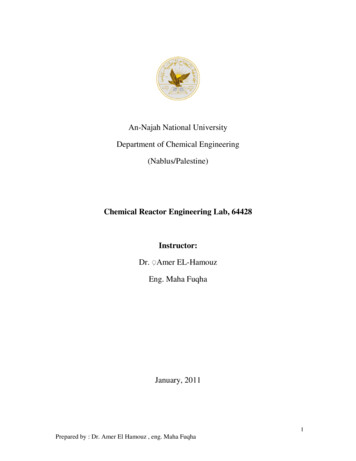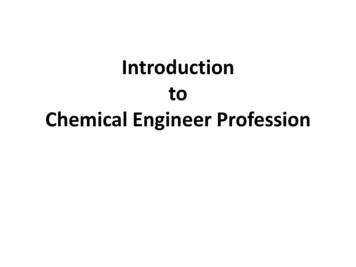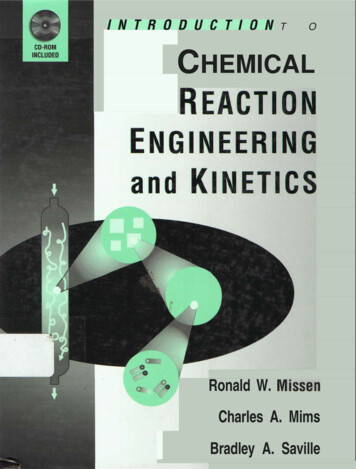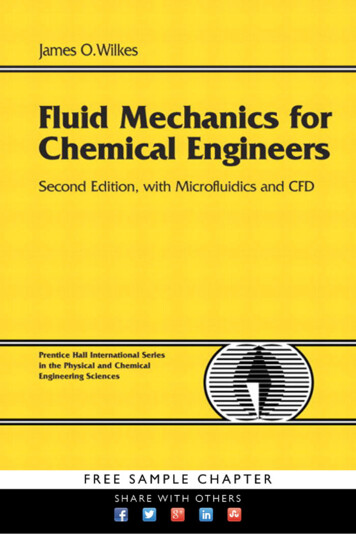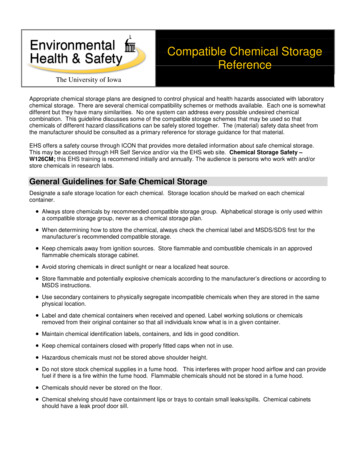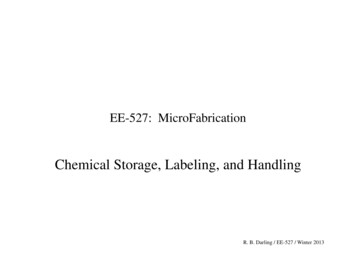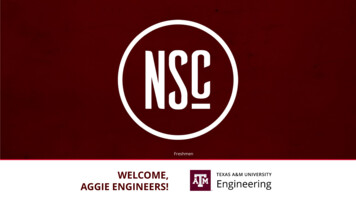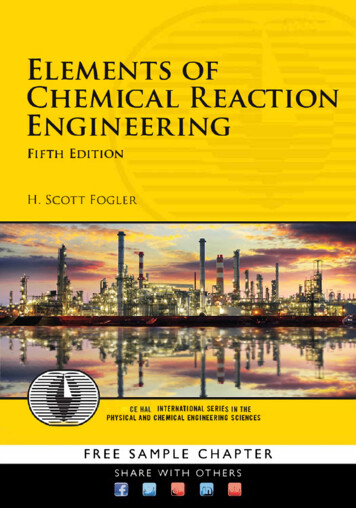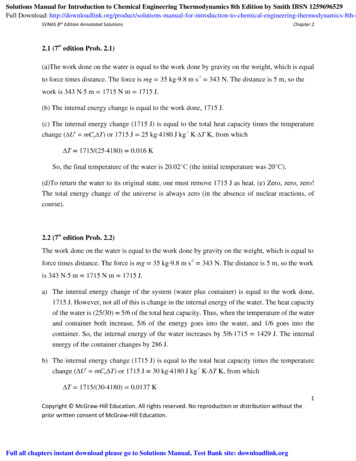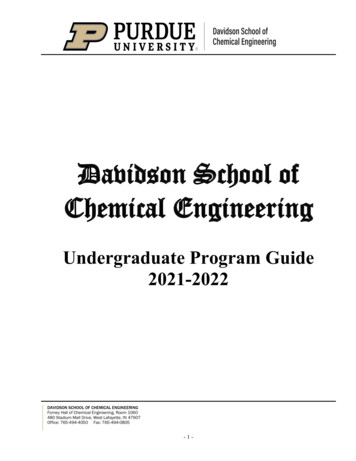
Transcription
Davidson School ofChemical EngineeringUndergraduate Program Guide2021-2022DAVIDSON SCHOOL OF CHEMICAL ENGINEERINGForney Hall of Chemical Engineering, Room 1060480 Stadium Mall Drive, West Lafayette, IN 47907Office: 765-494-4050 Fax: 765-494-0805-1-
Contents. 5Welcome to Chemical Engineering!. 5The Purdue Chemical Engineer . 5ChE UNDERGRAD STUDENT SERVICES . 6THE CHE UNDERGRADUATE OFFICE. 7Academic Advising . 7Registration . 8BS DEGREE OUTLINE . 9Chemical Engineering Major Core . 9Other Departmental Course Requirements . 9** Chemical Engineering Selective and Engineering Selectives Policy ** . 10A maximum of 6-cr of research (CHE 41100, 41200, 49800, 49900, may apply toward: . 10 Chemical Engineering Selective (3-cr) and Engineering Selective (3-cr) OR . 10Technical Selectives (3-cr) . 10Credit may be established in only one course, due to similarity of material content . 10 ABE 58000 or CHE 52500 . 10 CHE 33000 or MSE 23000. 10These courses may not count in the Engineering Selective requirement (as listed in mPP) . 10 ABE 20100, 21000, 30800, 37000 or IE 23000, 33000 or ME 30900 31500 . 10GENERAL EDUCATION UPPER LEVEL SELECTIVES (6-cr) . 10Suggested Pathway of Chemical Engineering Courses . 11DEGREE ENHANCEMENTS . 11Research . 11Chemical Engineering Research, Internal . 11Chemical Engineering Research, External-Related . 12Minors . 12-2-
Concentrations . 12Study Abroad . 13HONORS PROGRAMS . 14Chemical Engineering Distinguished Research Concentration . 14* CHE 54000, Transport Phenomena, is highly recommended for graduate program preparation . 14Honors College . 14Contract for Honors Credits . 14ACADEMICS & REGULATIONS . 15Chemical Engineering Course Regulations. 15Academic Policy of Pre- and Co-requisite Courses . 15Pass/No-Pass Option . 16Retake/Repeat of Courses . 16Maximum Credit Limit . 17Course Conflicts . 17CHE Closed Courses . 17Override Requests. 17Auditing Courses . 17Accommodations for Students with Disabilities . 18Exam Accommodations. 18Special Courses . 19CHE Laboratory Courses: CHE 34800, CHE 37700, CHE 37800, CHE 43500 . 19CHE Seminar Courses: CHE 20000, CHE 30000, CHE 40000 . 19Remedial Courses: PHYS 14900, MA 15900, CHM 11100 . 19Research Projects: CHE 41100, CHE 41200 . 19Co-Op Program Courses . 19Co-Op Seminar Courses: CHE 20100, CHE 30100, and CHE 40100 . 19Internship Course: CHE 39699 . 19Graduate Credit. 19SPECIAL REGULATION EXCEPTIONS . 20ChE Course Exception Form . 20ChE Prerequisite Exception Form . 20ChE General Education Requirement Exception Form. 20ChE Concentration Course Exception Form . 20UNIVERSITY OFFICES . 21Office of the Bursar . 21-3-
Office of the Dean of Students . 21University Policy Office . 21Office of the Registrar . 21Student Regulations . 21Student Success Programs . 21Center for Career Opportunities . 22GLOSSARY OF PURDUE ACRONYMS. 23-4-
Welcome to Chemical Engineering!The purpose of this guide is to aid our undergraduate students in following registration procedures, academicregulations, and understanding the requirements for the baccalaureate degree in Chemical Engineering. Whilethis publication does not supersede any statements presented in the Purdue University Catalog, faculty documents,Office of the Dean of Engineering, or Office of the Registrar, it hopefully provides a summary and links topertinent information in navigating the academic journey at Purdue University.Your Academic Advisor will assist you with registrations, reviewing your academic plan, and fulfillment ofgraduation requirements for the BSChE degree. As stated by the University, the final responsibility for completingthe graduation requirements rests with the individual student. This handbook guide and the Schedule of Classespublished each semester should provide adequate information to the student for routine registration. In addition,students have a personal myPurduePlan (mPP), from which to view continuous progress for all academic pursuits,and a Plan of Study accessed with links to the University Catalog throughout this booklet. The UniversityRegulations Reference Book may be useful for finding information regarding the academic calendar, credittransfer, scholastic standing, changing a grade, etc.The Purdue Chemical EngineerChemical Engineers take chemistry and math into the world around us. They are creative problem solvers whoapply scientific knowledge and technical expertise to meet a worldwide demand for useful materials at areasonable cost and in the safest manner possible. Chemical Engineers are involved in creating new medicines,new materials, and new processes that improve the quality of life across the globe, protect the environment, andconserve our natural resources. They work in research, design, development, production, technical sales, andmanagement. Some are consultants, computer system designers, doctors, or lawyers focusing on patent orenvironmental law. Chemical Engineers are responsible for the basic necessities in life that many of us take forgranted. Because of the Chemical Engineer's unique background, Chemical Engineering is one of the broadestfields in the science-technical area. A background in chemical engineering offers a wide variety of career options.The Purdue Chemical Engineering Curriculum builds on the basic sciences and other branches of engineering.Elective programs developed by the student with his or her advisor can create options in such areas as appliedchemistry, biochemical engineering, biomedical engineering, chemical reaction engineering, chemical processing,energy and natural resources processing, environmental engineering, food processing, geoscience, materialsscience, nuclear engineering, pharmaceutical engineering, pre-law, pre-medicine, process control, production andsales, and systems engineering.-5-
CHE UNDERGRADUATE OFFICE** Office operations or procedures may change at any time. Changes will becommunicated via the ChE Undergraduate Blog, the Chemical Engineering UndergraduateWebsite and email notifications sent to the students @purdue.edu addresses.In-Person Office Hours: Monday-Friday; 9am-noon & 1-3pmThe ChE Undergraduate Office in FRNY G041 will be open for essential walk-ins during in-personoffice hours to answer general questions and to assist students, faculty and staff.Virtual Office Hours: Monday-Friday; 8:30am - 4:30pmto be connected with thevirtual ChE UG OfficeThe Undergraduate Office Team will also be available virtually to answer general questions and toassist students with virtual drop-ins and advising appointments.In-Person Office Hours:ThursdaysEvery 4th Friday of the monthIn-Person Office Hours:TuesdaysEvery 2nd Friday of the monthIn-Person Office Hours:WednesdaysEvery 3rd Friday of the monthIn-Person Office Hours:MondaysEvery 1st Friday of the monthIn-Person Office HoursAn Undergraduate Team Member will be available in FRNY G041 to assist visitors, students, faculty and staff Monday-Friday9am-noon & 1-3pm.Virtual Drop-ins for Current ChE StudentsThe ChE Academic Advisors are all available for virtual “drop-in” meetings during the first week of the semesterMonday - Friday, 9am-noon and 1-3pm. Added evening hours are available from 8-10pm, Monday, August 23 Wednesday, August 25 for all ChE Students with the Karissa via her virtual office.Please refer to the ChE Blog or contact your advisor directly for more information including other designated "drop-in"times for their virtual walk-in hours throughout the semester.Virtual Appointments for Current ChE StudentsCurrent ChE students should email their advisor directly if they have questions that do not require a 15 minuteappointment. Virtual appointments for all matters, including registration, may be scheduled via BoilerConnect. Addedevening & weekend hours will also be available with Karissa for all ChE Students. To schedule outside of normalbusiness hours, please contact Karissa directly via email kraderstorf@purdue.edu or phone (765)494-0756.Prospective Students, CODO and T2M MeetingsAll CODO, T2M and prospective students and families may drop in during in-person office hours or call (765)494-5650 to speak with a ChE Undergraduate Staff Member.
THE CHE UNDERGRADUATE OFFICEThe student services office staff is dedicated to working with our undergraduate population with each Advisor andstaff member, indicating specific cohorts or related responsibilities to our students: Karissa Raderstorf, Transfers, CODO and T2MCaryn Morgan, Study Abroad LiaisonAllen R. Reigel, Co-Op Program studentsSandy Hendryx, General questions, academic forms, tutorsDr. Gabriela Nagy (FRNY G051), Co-Op Program, Internships, and Instructor of all seminar coursesThe Advisors utilize different communication methods to assist our students in academic advisement. A studentmay connect with their assigned Academic Advisor through:Academic Advising“The mission of undergraduate advising at Purdue University is to partner with students, faculty, staff,departments, and administration to empower students to develop and implement an individualized plan foracademic success, and personal and career development, while integrating learning and enrichment within theUniversity and community, as well as assisting students in understanding the nature, purpose, and value ofhigher education.” – Purdue University AdvisingIn the mission of the university, the Davidson School of Chemical Engineering undergraduates are assigned toan Academic Advisor who works with the student through many academic related matters. The Advisor is thestudent’s most utilized front-line resource throughout their education for reasons such as: Questions about the degree program, minors, concentrations, plans of study, etc.Study Abroad and how courses may apply toward degree requirementsPersonal issues interfering with academic performanceAcademic Probation/deficiency issues – poor performance in Chemical Engineering courseworkRegistration (required by the University)Questions about other resources on campusIn that capacity, students in Chemical Engineering can expect their advisor to: Assist with long- and short-term goal setting Discuss personal and academic interests Establish a positive working relationship toprovide a welcoming atmosphere at Purdue Teach how to analyze academic informationand make well-informed choices Educate on various policies and proceduresnecessary to navigate the University Inform student of their responsibilities in theadvising process Refer to campus resources/services as needed Explain degree and major requirements Discuss student’s academic performance Assist with major exploration and interpretingdegree requirements Empower student to advocate for themselves Support personal concerns and academic issues Provide a safe, inclusive environment Provide detailed knowledge and guidanceabout the standards and program(s) they advise Help navigate plan of study and requirements Inform about prerequisites for program courses-7-
Students are expected to fulfill the following responsibilities in the advising process: Meet Advisor minimally once per semesterand be prepared with courses and questions Review degree requirements and progress Be informed of Purdue and School of ChEacademic policies and procedures Be proactive in your education; seek help atthe first sign of concern! Accept there may be possible struggles insome classes. Work hard and communicate! Know your Academic Advisor Communicate about research, study abroad,experiential learning goals for timely planning Check @purdue.edu email account daily Explore new and challenging opportunities Develop realistic short- and long-termeducational and career goals Familiarize with campus resources, services Notify your advisor of any academicdifficulties or changes in program interestsRegistrationEach semester, ChE Students will communicate with their assigned academic advisor to discuss their courseregistration for the following semester. Once the student and advisor have discussed the upcoming semester,students will have access to the Course Registration Form (CRF) via Scheduling Assistant to confirm enrollmentin the courses they selected for the following term. Students must submit the CRF prior to the university deadlineto receive a schedule during the Pre-Registration/Batch process. During open registration, students may adjusttheir schedules using their registration PIN provided by their ChE Advisor.Find more information at Pre-Registration FAQ’s.-8-
BS DEGREE OUTLINEThe degree is comprised of two main fields; Chemical Engineering major and Other Departmental Courses, withthe latter entailing three sub-areas. The official degree plans for each catalog term is on the University Catalog.Degree requirements and total credits for each degree field coincide with student’s listed catalog term.Chemical Engineering Major Core 2018 FALL or PRIOR: 41-cr in the major for students admitted or entered with these catalog terms2019 FALL and AFTER: 46-cr in the major for students admitted or entered with these catalog termso Why a credit variance? The 5-cr difference results from CHE 20000 and CHE 30000 now each 1cr vs. 0-cr (prior to 2019) and addition the Chemical Engineering Selective (3-cr) into theNote: CHE 49700 and 59700 are temporary numbers assigned to newer material offerings and can meetChemical Engineering Selective dependent on the content of the course (i.e. short Study Abroad does not)Other Departmental Course RequirementsTo further one’s academic breadth, beyond their major technical study, these requirements provide students with aholistic education with a variation of subjects in providing foundational knowledge support for both majorcoursework and future collaboration encounters in industry. These requirements satisfy mandates as set forth bythe University (UCC); School of Chemical Engineering; College of Engineering; and ABET.It is important to understand for selective requirements, the approved courses have been identified based on thecontent and standard by the faculty, without regard to frequency offered. While these lists include active courses,not all are available in a given semester, so always reference “Look Up Classes” for offerings.FYE: First-Year Engineering CoreMUST be successfully completed for T2M and CODO review. CODO’s may be admitted without ENGR13100/13200 coursework completed due to ineligibility to enroll previously as a non-FYE student.Chemical Engineering STEM Core (36-credits) The STEM Core is necessary supplemental coursework for Chemical Engineering understanding.Selective option courses must be from the provided approved linked list to satisfy that requirement.Biology Selective (3-cr)CHM 26100 (3-cr), Organic Chemistry ICHM 26300 (1-cr), Organic Chemistry Laboratory I (registered separately)CHM 26200 (3-cr), Organic Chemistry IICHM 26400 (1-cr), Organic Chemistry Laboratory II (registered separately)CHM 37000 (3-cr), Physical Chemistry**Engineering Selectives (6-cr) See notes below**MA 26100 (4-cr), Multivariate CalculusMath Selectives: Linear Algebra and Differential Equations; there are seven available track optionsMA 26500 (3-cr), MA 26600 (3-cr) the Department of Mathematics recommends this sequenceA variation of accumulated credits is possible dependent on the track opted to followPHYS 24100 (3-cr), Electricity & OpticsTechnical Selective (3-cr)-9-
** Chemical Engineering Selective and Engineering Selectives Policy **A maximum of 6-cr of research (CHE 41100, 41200, 49800, 49900, may apply toward: Chemical Engineering Selective (3-cr) and Engineering Selective (3-cr) ORTechnical Selectives (3-cr)Credit may be established in only one course, due to similarity of material content ABE 58000 or CHE 52500 CHE 33000 or MSE 23000These courses may not count in the Engineering Selective requirement (as listed in mPP) ABE 20100, 21000, 30800, 37000 or IE 23000, 33000 or ME 30900 31500General Education Selectives (18-credits)As a longtime degree staple supporting of general education coursework, this field overlaps with requirementsinstituted in the University Core Curriculum (UCC); BSS, HUM, and STS (3-cr each). These are required of allundergraduates to ensure achieving common academic and foundational goals and must come from the approvedUCC course lists. Additionally, there are General Education and General Education Upper Level requirements (9cr total), from the ChE approved list, satisfying a diverse education as directed by ABET. Behavioral Social Science (BSS)Humanities (HUM)Science, Technology & Society (STS) General Education Selective (3-cr)Gen Ed Upper Level Selectives (6-cr)GENERAL EDUCATION UPPER LEVEL SELECTIVES (6-cr)As of Fall 2019, to ensure cohesiveness and consistency, students must select courses from this approved list tosatisfy the intended degree requirement. The list has been expanded to also include courses from thedepartments of CSR, ENTR, MGMT, OBHR, TLI (for those which follow the requirement definition), as wellas individual options of NUTR 30300 and FS 47000 for a range in choice availabilities.What defines a General Education Upper Level course?A course having a listed prerequisite of the same subject (i.e. PSY 20000; PSY 12000 prereq) or is listed as30000-level and higher, which may or may not have a prerequisite (i.e. HIST 35100).Are there possible exceptions for the requirement?If a course appears to have relevant foundational content, but is not on the list, the student may submit thecourse syllabus and exception form through their Advisor for review by the Undergraduate Committee.- 10 -
Suggested Pathway of Chemical Engineering CoursesThis is considered the critical CHE course path, and, due to the layout of prerequisites and offerings, studentsshould follow this outline, post-successful completion of First Year Engineering (FYE) in one academic year, tograduate in the four-year timeline. CHE 20500 should be successfully completed by fall term of the 2nd year toavoid a heavy course load in the third-year Spring and fourth-year Fall terms. Deviating from this pathway, or notmeeting course grade requirements, may result in an additional year to graduate.FALLCHE 20000CHE 20500FALLCHE 30600CHE 37700FALLCHE 40000CHE 42000CHE 43500CHE 456002nd YearSPRING2nd Year(Fall only) CHE 21100CHE 32000rd3 YearSPRING3rd YearCHE 30000(Spring only)CHE 34800CHE 378004th YearSPRING4th Year(Fall only) CHE 45000(Fall only) CHE Selective(Fall only)CHE 20500 Enrollment & CODO and Transfer Students* ENGR 13100 (prerequisite) must be successfully completed prior to CHE 20500 enrollment* CHE 20500 may be taken concurrently with ENGR 13200, a FYE Core and degree requirement* CHE 20500 is offered Fall and Spring semesters and Summer sessionsDEGREE ENHANCEMENTSWhile the curriculum set forth is challenging and provides a strong foundation in the area of ChemicalEngineering, in preparation to be productive and an asset in the industry, many students seek additionalopportunities to integrate enhancements based on interests or career choice. Listed are ways for students toachieve enrichments within an academic setting along with, or as a substitute, to Co-Op or internship avenues.ResearchWhile research is not required for the degree, it is often pursued for selective degree requirements, and a facet ofeducation bridging theory with application of knowledge from coursework into simulation of “real world” aspectswhile working closely with a faculty mentor. The School of Chemical Engineering has options for research andinnovation allowing students to capitalize on experience and earn degree credit while expanding their perspective,application into products in Chemical Engineering, and enhancing their reporting and communication skill sets inpreparation for industry and achieving the expectations of our graduates. These opportunities are highlyrecommended for those students seeking continued education of Masters and PhD.Chemical Engineering Research, InternalMany School of Chemical Engineering faculty are involved in research for discovery and impact to enhancecontributions to their classroom and labs, industry and world communities. With these objectives, often facultyhave opportunities for undergraduate students to pursue and combine their academics to application of everydayneeds addressed by industry through experiential learning.- 11 -
How to Register: In a professional manner, the student approaches the faculty with whom they wish to workbased on the project or relation of their area of interest. Both parties must agree on involvement (hours/week;meeting frequency; other expectations) and fill out on official form, then student files the form electronically withthe Undergraduate Office by the second Friday of the term doing research (first week of summer). Upon approval,the registration process will be provided at that time. ChE Research/Design ContractChemical Engineering Research, External-RelatedSome Chemical Engineering students secure research with faculty in other campus departments. This is notdiscouraged as the presented experience can offer exposure of application of Chemical Engineering concepts andhow it may be engrained in other fields, such as pharmaceuticals, foods, health, and more. The School ofChemical Engineering supports this notion and our students contributing elsewhere.How to Register: If a student wishes to have their external research credit apply toward their ChE degree, andrecognized as an appropriate CHE course, the student and external faculty must fill out a supplied form indicatingthe content of the research and how it integrates Chemical Engineering concepts. The student must file theapplication electronically with the Undergraduate Office on or before the Friday of the first week of the semesterperforming the research. The application will be reviewed by the faculty of the Undergraduate Committee for adecision in the second week. ChE Research/Design Contract: External Research AdvisorMinorsMany departments campus-wide offer a minor providing knowledge of an area supplemental to the degree, butnot as extensive as the major allowing for completion usually without extending graduation based on start ofstudy. When the minor requirements are successfully completed, as outlined by the offering Department, it isdisplayed on the academic transcript. While not all minors are available to all students, an official list of all activeminors at Purdue is found o
The Purdue Chemical Engineering Curriculum builds on the basic sciences and other branches of engineering. Elective programs developed by the student with his or her advisor can create options in such areas as applied chemistry, biochemical engineering, biomedical engineering, chemical re
